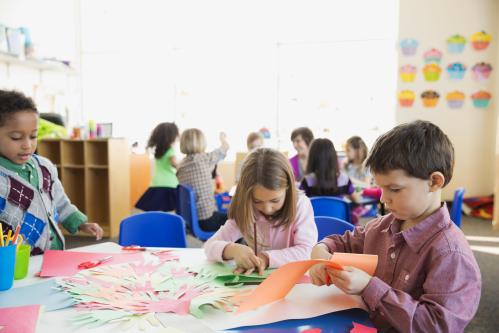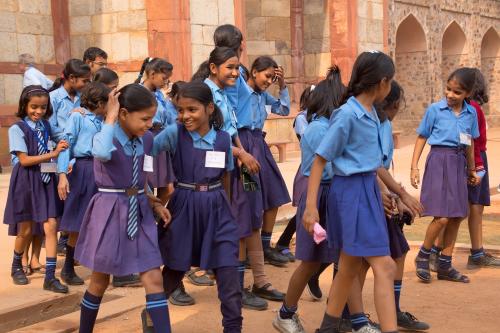The principal of Al-Manar Modern School in Mount Lebanon, Jinan Shayya, was skeptical of the idea of surveying teachers’ and parents’ beliefs on education to increase family, school, and community engagement. Jinan’s school was just coming out of the COVID-19 pandemic, and Lebanon was going through what the World Bank ranked as one of the most severe financial and economic crises globally, since the mid-1800s.
Nevertheless, Jinan had agreed to organize a process for community engagement inspired by the Center for Universal Education’s (CUE) research on family, school, and community collaboration, and to survey the students, teachers, and parents at her school about their beliefs and values on education. This was part of a country-wide effort mounted by a group of Lebanese citizens to fill the void left by the government that had left schools to fend for themselves in the face of the crippling economic crisis. Nafda, a collective that aims at building a movement towards change in Lebanon’s education sector, was named by participating school principals and means “shaking the dust off” in Lebanon (or deep spring cleaning).
In the current context of Lebanon, hope will be the most precious asset that the schools will need on this journey.
The surveys of the Al-Manar School went beyond students, teachers, and parents, and it extended to community-based organizations and community activists in Ras el-Metn and neighboring villages. The surveys revealed convergence on a few themes, including:
- Prioritizing safety in the classroom and the opportunity for students to learn at their own pace and in ways that suited their learning styles and abilities.
- Prioritizing critical thinking as the main skill to acquire.
- Deprioritizing the ability to pass official exams and get good grades in class.
The subsequent conversations facilitated by Jinan and teachers of Al-Manar inspired a flood of ideas about how parents and community members could support the school to take action on jointly prioritized areas. The broader message of nafda also seemed to resonate with parents and community members—encouraging commitment and action to embed the values of engaged citizenship, good governance, and social justice in the school and surrounding community.
The conversations also led to new forms of family, school, and community engagement. The head of one of the national environmental clubs from Ras-el-Metn volunteered to organize trips so students could learn about indigenous plants in the neighboring forests. Several parents volunteered to become teacher-aides who would be trained on supporting students with special educational needs to help them learn at their own pace.
For the first time in years, Jinan and the teachers of Al-Manar felt seen, valued, and supported.
Jinan shared her experience with the other 19 schools that had joined the nafda movement, and they too embarked on a similar process of community engagement and a transformation journey of their own. Over the past 12 months, all 20 schools have experienced a steady influx of hope, in spite of the deteriorating situation around them. This hope came in large part from connecting with each other and importantly from engaging with communities in a structured and purpose-oriented way.
From Vision to Action
After the foundational nafda schools had all gone through their community engagement process, they huddled and mapped out the common themes that emerged in their conversations with their communities. The themes included experiential learning, STEM/STEAM, self-expression and student well-being, inclusive and equitable learning, and community service. The schools organized themselves into “learning labs,” each corresponding to one of these themes.
To make progress on their chosen themes, each school organized a 100-day challenge project in its learning lab. This is a way of designing and managing projects that fosters intense collaboration and rapid innovation, and that has been pioneered in a variety of social sectors by the nonprofit RE!NSTITUTE.
About 25 local NGOs that provide innovative educational solutions to schools and communities were mobilized to support the schools in shaping and implementing their projects. Each school team was provided a block grant that they could spend as they saw fit to advance toward their 100-day project goal. The process resembled a market space where educational innovators pitched their support to school teams, and the latter decided which organizations to work with and how to do so.
School Impact in 100 Days…
Some of the schools have completed their 100-day challenge projects, and the initial results are inspiring.
In the remote agricultural town of Hermel, the Esprits Libres school focused on experimenting with multidisciplinary learning, which was one of the themes that emerged in their community engagement process. Hermel has a long tradition as an agricultural hub, and the school chose permaculture as a thematic area for experiential learning. Students researched the topic, neighbors donated the land, and the students with help from community members and guidance from a permaculture enthusiast in the region planted and nurtured their crops in a manner to eliminate the need for artificial fertilizers and pesticides.
Working at an unprecedented pace, the Esprits Libres teachers adapted all their learning lesson plans to align with the topic of permaculture. Students were extracting theories of collaboration and social cohesion from observing the way plants, when provided an enabling environment, protected and supported each other as they grew. Students also learned math, marketing, and rudimentary business skills as they prepared to bring their produce to market. Esprits Libres parents enthusiastically bought and marketed the produce, and they explained to other farmers the virtues of permaculture that they learned from their children.
As for Jinan, the initial focus of her school was on inclusive and equitable learning. During the 100-day period, all teachers were trained on differentiated instruction by a leading regional nongovernmental organization that specialized in this area. In internal assessments, around half of K-12 students showed academic progress during the period, especially students with identified learning difficulties
Importantly, the projects infused hope in their surrounding communities, and gave teachers, students, and parents a sense of belonging and ownership of the learning process. In fact, several nafda schools experienced a spike in school registrations despite the continuing economic meltdown.
Beyond School Impact
Having intentional conversations on beliefs on education helped nafda schools connect with their communities through shared priorities and joint action to make progress on these priorities.
In the unique context of Lebanon, the process of family, school, and community engagement also helped in two more subtle but possibly even more consequential ways:
1. Creating a shared experience
The process provided a common experience for schools from around the country. This contributed to their sense that “we are all facing similar issues, and we have common aspirations.”This sense of connecting through common issues and aspirations went beyond the school principals. The students, teachers, parents, and other community members who were involved in the community engagement process and the subsequent 100-day projects also experienced this sense of connection with peers from around the country. This sense of shared purpose had been missing in Lebanon for decades, especially once one crosses regional and religious lines. As the nafda movement grows, this can have significant political implications for the country.
2. Emergence of school-community-led vision for change
With government institutions becoming “hollowed” out over the past three years and the massive departure of civil servants, it is doubtful whether the Ministry of Education has the capacity to shape a future vision for schools in the country. The community engagement process that nafda schools used became a foundation for legitimizing an emerging vision for what the “school for tomorrow” might look like in the country. This is an evolving vision that no doubt will be enriched and adapted as more schools join the nafda movement. Ultimately, a vision for the broader education system in the country may emerge from the work of nafda schools and the conversations this work inspires within and across communities, and with thought leaders in the sector. This will likely have more legitimacy and grassroots support than the various visions and strategies developed by the ministry, or with the ministry by international experts.
Fueling the journey
The nafda movement is in its early stages. The 20 founding school principals are preparing themselves and their schools to invite more schools into the movement and to support them on their journey. There is a long way to go before the movement reaches a tipping point—where the education system is on an irreversible path to a more promising future. In the current context of Lebanon, hope will be the most precious asset that the schools will need on this journey. Engaging communities and inviting them to be part of the journey is the nafda strategy for generating hope in the midst of the sea of despair currently engulfing the country.






Commentary
Connecting schools and communities can restore hope in the possibility of change in Lebanon
February 23, 2023